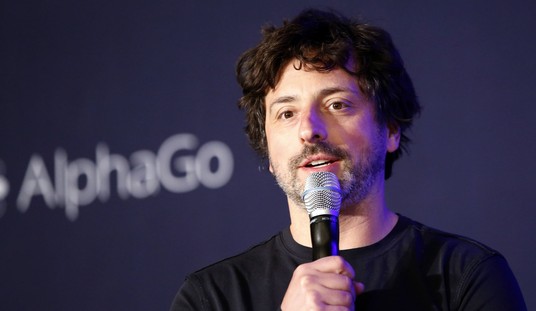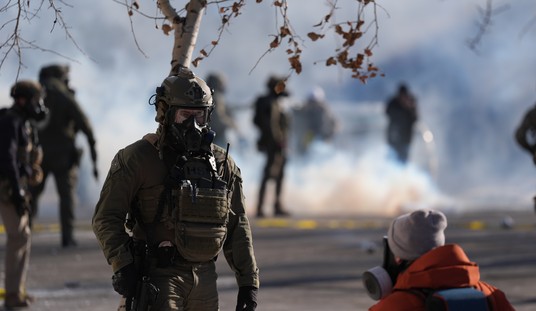Russia may be on the run in Ukraine, but they’re still dangerous — and perhaps even more so as a result. They still control ground around Europe’s largest nuclear power plant in Zaporizhzhia, and they want Kyiv to contemplate the potential consequences of that fact. Russian forces fired shells close enough to Ukraine’s second-largest power plant in Yuzhnoukrainsk, prompting accusations of “nuclear terrorism” from Volodymyr Zelensky and his government:
Ukrainian officials accused Russia of “nuclear terrorism” on Monday after a rocket reportedly hit just hundreds of yards from the reactors at Ukraine’s second-largest nuclear power plant, disabling three high-voltage electricity lines and a hydropower unit, and blowing out windows.
Energoatom, the Ukrainian national nuclear power company, said that a “powerful explosion occurred” roughly 300 yards from the reactors of the Southern Ukraine Nuclear Power Plant, which is located near the city of Yuzhnoukrainsk, just after midnight on Monday, sending shock waves that damaged buildings and shattered more than 100 windows.
Details of the rocket strike, which Energoatom reported on its Telegram channel, could not be independently verified. But Ukrainian President Volodymyr Zelensky posted a short video in his own Telegram channel of what appeared to be footage of the strike taken from a closed-circuit camera, along with photos of the subsequent damage.
“Russia endangers the whole world,” Zelensky wrote in the post. “We have to stop it before it’s too late.”
It doesn’t appear to be an accident, either. A second round of missile attacks hit nearly the same position, the New York Times reports:
The statement said the operators reduced output and disconnected one reactor from the electrical grid. “Releases of radioactive substances were not recorded,” the statement said.
Hours later, the energy company reported a second attack on Telegram, saying Russians had fired three rocket-propelled grenades that landed near one of the nuclear reactors. The explosions, the statement said, damaged an auxiliary building and a specialized station. “Fire danger is high,” the company said.
The International Atomic Energy Agency said it was aware of the reports and seeking further information about the situation.
In case anyone’s missing the point, an ally of Vladimir Putin in the Duma made it crystal clear. Andrey Gurulyov, a former military deputy commander, bragged that Russia could turn the UK into a “Martian desert” with nuclear strikes, and told a TV audience that Russia had no choice but to “grind up” Ukraine as a show of force to NATO:
Meanwhile in Russia, more of the usual: nuclear threats against Germany and Britain, cautioning NATO against going into Ukraine. This directly clashes with their lies, constantly spewed by state TV, that Russia is already at war with NATO & "uniformed NATO troops" are in Ukraine. pic.twitter.com/ioMgbrzhbF
— Julia Davis (@JuliaDavisNews) September 19, 2022
Gurulyov said: “We should be talking about this, a happy, well-fed German ‘Burger’ [citizenship] whose butt is already starting to get cold ahead of the coming winter.
“[Biden] should understand that if there’s a strike against the decision-making centers, the main decision-making center is Berlin.
“Not only will his house freeze up, but his entire nation will be in total chaos, which essentially means his own demise,” said Gurulyov.
“Biden says there would be a reaction, per their Article 5, but if we turn the British Isles into a Martian desert in 3 minutes flat, using tactical nuclear weapons, not strategic ones, they could use Article 5, but for whom?
“A nonexistent country, turned into a Martian desert? They won’t respond.”
Gurulyov offers a lot of bluster, and perhaps a lot of projection at the same time. Putin and his allies have tried to claim that NATO forces have been on the ground the whole time as “mercenaries”; Gurulyov puts the number at 50%, an absurd figure under any circumstances. That kind of deployment would be impossible for anyone to miss. Even the nominally friendly Western media would have noticed that kind of mass movement into Ukraine.
The real “mercenary” news comes from the other side of the line. The Institute for the Study of War reports that Putin is now bypassing military command to create new units, and apparently an entire 4th Army Corps, through the recruitment of irregulars. Putin no longer trusts his military commanders, ISW assesses, and wants to get around them. The problems that will create will only compound Russian failures in the region, however:
Russian President Vladimir Putin is increasingly relying on irregular volunteer and proxy forces rather than conventional units and formations of the Russian Federation Armed Forces. ISW has previously reported that Putin has been bypassing the Russian higher military command and Ministry of Defense leadership throughout the summer and especially following the defeat around Kharkiv Oblast.[1] Putin’s souring relationship with the military command and the Russian (MoD) may explain in part the Kremlin’s increasing focus on recruiting ill-prepared volunteers into ad-hoc irregular units rather than attempting to draw them into reserve or replacement pools for regular Russian combat units.
A prominent Russian milblogger reported that Russian forces have “already began the process of forming and staffing the 4th Army Corps, at least on a documentation level.”[2] The report may be true given the recent Russia-wide push for the formation of more regional volunteer units among the Kremlin representatives following the Russian defeat around Kharkiv Oblast.[3] Russian federal subjects had previously begun advertising for contract service in volunteer units around the time of the formation of the 3rd Army Corps.[4] Russian forces are also increasingly recruiting prisoners, involving Cossack units, deploying elements of Russian security services such as the Russian Federal Security Service and Rosgvardia, and covertly mobilizing men from occupied Donetsk and Luhansk oblasts. The continued focus on the formation of irregular units is receiving some criticism from retired Russian officers who are calling for proper conventional divisions rather than volunteer battalions.[5]
More notably, however, Russia is already compensating for this issue by attempting an orderly withdrawal around a key strategic position. They have fortified their positions in Kherson, with significant help from forced civilian labor, but apparently see the Ukrainian counteroffensive in the southwest as irresistible:
Russian forces are likely attempting to conduct a more deliberate and controlled withdrawal in western Kherson Oblast to avoid the chaotic flight that characterized the collapse of Russian defensive positions in Kharkiv Oblast earlier this month. …
The Ukrainian counteroffensive in Kherson Oblast is nevertheless making progress, and Russian forces appear to be attempting to slow it and fall back to more defensible positions rather than stop it cold or reverse it. Continuous Ukrainian attacks on Russian ground lines of communication (GLOCs) across the Dnipro River to western Kherson Oblast appear to be having increasing effects on Russian supplies on the right bank—recent reports indicate shortages of food and water in Russian-occupied Kherson City and at least a temporary slackening of Russian artillery fire. Poor-quality proxy units have collapsed in some sectors of the Russian front lines, moreover, allowing Ukrainian advances. Ukrainian forces remain likely to regain much if not all of western Kherson Oblast in the coming weeks if they continue to interdict Russian GLOCs and press their advance. Ukrainian gains may continue to be slow if the Russian troops can retain their coherence but could also accelerate significantly if Russian forces begin to break.
Wars are not won by orderly retreats, but they are lost less badly that way than in routs. Putin seems to have belatedly realized that and wants to slow down the Ukrainians enough around Kherson to retain his men and materiel. Even if Putin succeeds in an orderly withdrawal from Kherson, however, it still abandons that key position and the Russian ability to maintain communications with Crimea. Their navy no longer has that capability, thanks to successful Ukrainian actions against the Moskva and other ships.
About the only way Putin can get anything out of this war is if he falls back and concentrates his forces in the regions of the Donbas that were under Russian control in the beginning of the war — a stalemate outcome, perhaps, if he can get Zelensky to negotiate an end to the conflict on that basis. First, though, he has to get the Russians to stop running and disintegrating in combat, and Putin’s running out of effective forces to accomplish that. That explains the nuclear terrorism today, which Zelensky’s forces can hopefully disarm quickly.








Join the conversation as a VIP Member